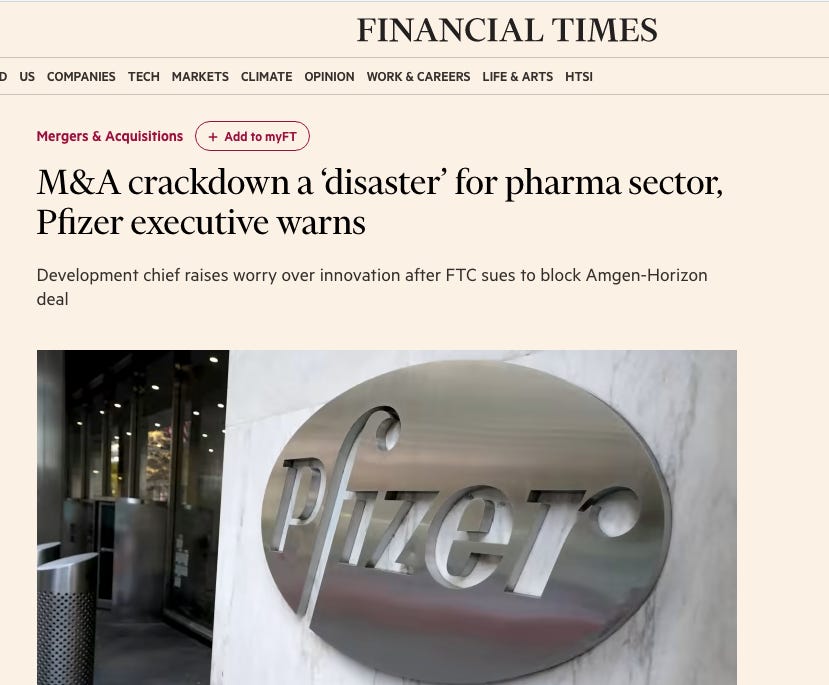A senior Pfizer executive has warned that a crackdown on mergers and acquisitions by antitrust regulators would be a “disaster” for the system of innovation that underpins the pharmaceutical industry.
William Pao, Pfizer’s chief development officer, said M&A is an important part of the funding ecosystem that supports the development of innovative therapies by scientists.
“I think it will be a disaster for the system,” he said on Wednesday when asked what impact a tightening of the antitrust regime would have on the sector.
“If you can’t get those M&A [deals] and then get those molecules distributed across the globe, it stifles innovation for sure,” said Pao, who heads the Pfizer arm responsible for clinical development of drugs and ensuring a pipeline of new therapies.
His comments came after the US Federal Trade Commission on Tuesday sued to block Amgen’s $28bn takeover of Horizon Therapeutics. It marked the first time in more than a decade that the US competition regulator has sought to halt a deal in the pharmaceutical sector.
Analysts have warned the FTC action threatens to upend a decades-long business model pursued by large pharmaceutical companies, which often rely on buying small and midsize biotech groups to replenish their drug pipelines.
“The FTC filing a lawsuit to block this deal will dampen M&A enthusiasm across the biotech sector, particularly given the lack of direct portfolio overlap between Amgen and Horizon,” said Matt Phipps, analyst at William Blair, an investment bank.
Several analysts have said that Pfizer’s proposed $43bn purchase of Seagen, announced in March, could also come under threat from the FTC.
Pao, speaking at the Financial Times US Pharma and Biotech Summit in New York, said he was confident the FTC would approve the Seagen deal. Pfizer on Tuesday raised $31bn in a jumbo-sized bond sale that will help fund the takeover.
Earlier at the conference, Amgen chief executive Robert Bradway expressed confidence his company would succeed in closing its acquisition of Horizon despite the FTC’s opposition.
Amgen and Horizon have both said they will try to fight the FTC in court in order to complete the transaction.
The FTC argued that Amgen could use the rebates it pays on its “blockbuster” drugs to press insurance companies and pharmacy benefit managers into paying for two of Horizon’s medicines: Tepezza for an autoimmune condition that affects the eyes and Krystexxa for a rare type of gout.
If Amgen were to own these medicines and use its market clout to convince payers to cover them, it could discourage other companies from launching rival medicines that would eventually bring down the price, the FTC said. Tepezza costs approximately $350,000 for a six-month course of treatment, while an annual supply of Krystexxa costs $650,000, according to the agency.
Pfizer’s bond deal on Tuesday was the fourth biggest of its kind, numbers from Dealogic show. The order book stood at roughly $85bn, according to people familiar with the details.
The eight-part borrowing, spanning maturities from two to 40 years, topped Amgen’s $24bn issuance in February. According to the terms of the bond sale, if the Seagen deal does not go through on time, or at all, Pfizer would redeem most tranches of the bonds and reimburse investors. But two of the bonds — maturing in 10 and 30 years’ time — will not be subject to those requirements.
Dan Mead, head of the investment-grade syndicate at Bank of America — a lead bookrunner on the Pfizer bond sale — said it was “not uncommon to see that for financings”.
“Issuers often will have financing needs beyond the M&A financing, where they may want to continue to have that debt outstanding if, for whatever reason, the merger or acquisition doesn’t go ahead,” Mead said.
M&A crackdown a ‘disaster’ for pharma sector, Pfizer executive warns


